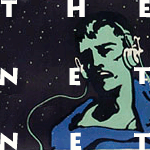The one thing that's always true of a Bela Fleck album is that you'll
never know what to expect.
Fleck, described as the "enfant terrible of bluegrass" by David Grisman in
the early 80s, has single-handed moved the banjo out of the haybales and
redneck cliches and onto the Tonight Show and the Lincoln Theater. He's
done this with relentless musicianship and an ability to attract both jazz
aficionados and college jam-rock lovers with his jazz-bluegrass-rock
fusion band, Bela Fleck and the Flecktones.
With a reputation like this, you might expect Fleck's latest album to be
jazz. You'd be wrong: it's as bluegrass an album as he's ever made. You
might expect it to be full of the show-off solos that instrumental
bluegrass has a reputation for. You'd be wrong again: it's a musical album
without being a stage for ego puffing.
This album sees Fleck reunite with friends Sam Bush (mandolin), Jerry
Douglas (Dobro), Tony Rice (guitar), and Mark Schatz (bass). This
represents their most tasteful playing, energy without machismo, soul
without saccharine, tradition without cliche. The warm rich sound of the
album comes as much from the deep acquaintance each musician has with the
others as with any tricks of microphones or mixing boards.
This isn't Fleck's first all-acoustic album. In fact, he spent the 80s
experimenting with bluegrass and jazz, yielding a series of albums on the
Rounder label that have become icons to experimental banjo players. He
even released "Tales from the Acoustic Planet" on Warner Brothers in 1995,
an all-acoustic jazz album featuring guest musicians like Branford
Marsalis and Chick Corea.
This album, the second in Fleck's acoustic series on the Warner label, is
far from the jazz vein. It opens with a bouncy tune, "Blue Mountain Hop,"
in whose simple pentatonic melody you can hear the echoes of dozens of
Appalachian folksongs. From there the listener is taken on an enjoyable
74-minute journey through traditional and progressive bluegrass,
culminating in the driving "Major Honker."
Highlights from the album are hard to find, because each and every tune is
catchy and individually exceptional. The tracks that stood out on first
listening: "Spanish Point," a modern-sounding composition whose medium
tempo sounds faster because of its ever-shifting chord progression; "Maura
on a Bicycle," an Irish-sounding tune from one of the two medleys on the
album; the Bill Monroe-sounding "Dark Circles"; and the eerily chimed
"Katmandu."
Of particular note are the tracks not written by Fleck. "Polka on the
Banjo" is a strong cover of a song from the classic bluegrass band, Flatt
and Scruggs. John Hartford, of "Gentle on my Mind" fame, provides
excellent vocals, and who wouldn't sound excellent with background
vocalists Vince Gill, Tim O'Brien, and Ricky Skaggs?
Fleck also plays three duets, two with Earl Scruggs himself. These are
perhaps the most touching tracks on the album, with the master of fifty
years ago joining with today's master to play "Home Sweet Home" and "Foggy
Mountain Special." Audible on these tracks are the sounds Scruggs'
fingerpicks make on the strings. Normally these would be avoided with
microphone placement, but left in they provide an unexpected rawness and
sense of vulnerability that contrasts with the music being played.
This album is also significant not only in Fleck's discology, but also as
the first major-label bluegrass release since Warner's "Deliverance"
soundtrack in the late 70s. "Tales from the Acoustic Planet 2: The
Bluegrass Sessions" is sure to be nominated for a Grammy. It may also be
the start of more exposure and acceptance for bluegrass music in the
mainstream. Whatever wider role The Bluegrass Sessions may have in the
history of bluegrass music, it stands on its own as an acoustic music
classic.



